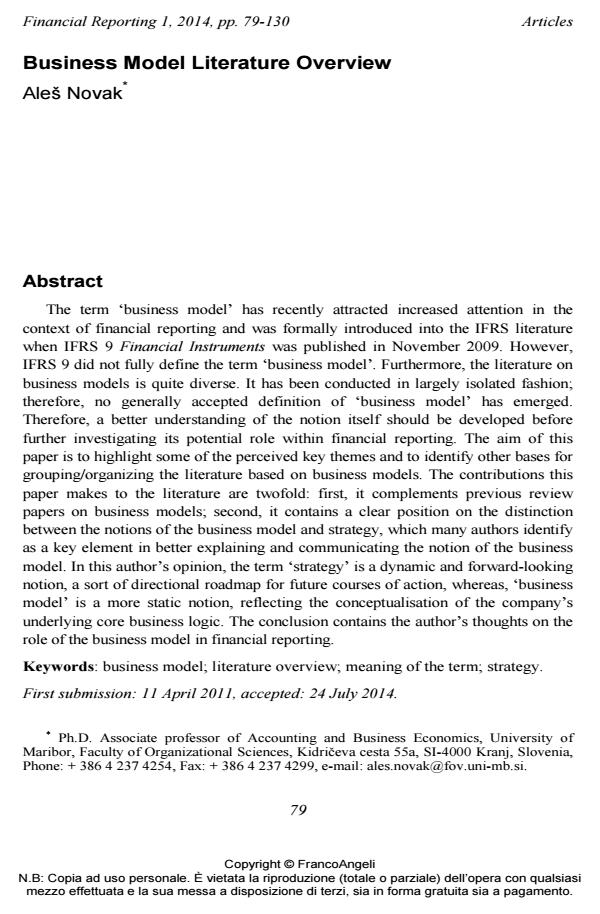Business Model Literature Overview
Titolo Rivista FINANCIAL REPORTING
Autori/Curatori Ales Novak
Anno di pubblicazione 2014 Fascicolo 2014/1
Lingua Inglese Numero pagine 52 P. 79-130 Dimensione file 468 KB
DOI 10.3280/FR2014-001004
Il DOI è il codice a barre della proprietà intellettuale: per saperne di più
clicca qui
Qui sotto puoi vedere in anteprima la prima pagina di questo articolo.
Se questo articolo ti interessa, lo puoi acquistare (e scaricare in formato pdf) seguendo le facili indicazioni per acquistare il download credit. Acquista Download Credits per scaricare questo Articolo in formato PDF

FrancoAngeli è membro della Publishers International Linking Association, Inc (PILA), associazione indipendente e non profit per facilitare (attraverso i servizi tecnologici implementati da CrossRef.org) l’accesso degli studiosi ai contenuti digitali nelle pubblicazioni professionali e scientifiche.
The term ?business model' has recently attracted increased attention in the context of financial reporting and was formally introduced into the IFRS literature when IFRS 9 Financial Instruments was published in November 2009. However, IFRS 9 did not fully define the term ‘business model’. Furthermore, the literature on business models is quite diverse. It has been conducted in largely isolated fashion; therefore, no generally accepted definition of ?business model' has emerged. Therefore, a better understanding of the notion itself should be developed before further investigating its potential role within financial reporting. The aim of this paper is to highlight some of the perceived key themes and to identify other bases for grouping/organizing the literature based on business models. The contributions this paper makes to the literature are twofold: first, it complements previous review papers on business models; second, it contains a clear position on the distinction between the notions of the business model and strategy, which many authors identify as a key element in better explaining and communicating the notion of the business model. In this author’s opinion, the term ‘strategy’ is a dynamic and forward-looking notion, a sort of directional roadmap for future courses of action, whereas, ‘business model’ is a more static notion, reflecting the conceptualisation of the company’s underlying core business logic. The conclusion contains the author’s thoughts on the role of the business model in financial reporting.�
Parole chiave:Business model; literature overview; meaning of the term; strategy
- Designing for Digital Transformation. Co-Creating Services with Citizens and Industry Maria J. Pouri, Lorenz M. Hilty, pp.297 (ISBN:978-3-030-64822-0)
- Nuclear hydrogen production for industrial decarbonization: Creating the business case for the near term Rupsha Bhattacharyya, Krishna Kumar Singh, Ravi Bhushan Grover, Kalyan Bhanja, in International Journal of Energy Research /2022 pp.6929
DOI: 10.1002/er.7572 - Investigating the key success factors within business models that facilitate long‐term value creation for sustainability‐focused start‐ups Ioannis P. Christodoulou, Ioannis Rizomyliotis, Kleopatra Konstantoulaki, Simona Alfiero, Sema Hasanago, Francesco Paolone, in Business Ethics, the Environment & Responsibility /2025 pp.936
DOI: 10.1111/beer.12681 - The Term “Business Model” in Financial Reporting: Does It Need a Proper Definition? Marco Sorrentino, Margherita Smarra, in Open Journal of Accounting /2015 pp.11
DOI: 10.4236/ojacct.2015.42002 - Business Model Disclosures, Market Values, and Earnings Persistence: Evidence From the UK Lorenzo Simoni, Stefan Schaper, Christian Nielsen, in Abacus /2022 pp.142
DOI: 10.1111/abac.12233 - Ecosystems and competition law in theory and practice Michael G Jacobides, Ioannis Lianos, in Industrial and Corporate Change /2021 pp.1199
DOI: 10.1093/icc/dtab061 - Big, Open and Linked Data Krzysztof Węcel, pp.181 (ISBN:978-3-031-07146-1)
- Digital business model configurations in the travel industry Mariia Perelygina, Deniz Kucukusta, Rob Law, in Tourism Management 104408/2022 pp.104408
DOI: 10.1016/j.tourman.2021.104408 - National Cultures in Times of Digital Transformation of the Travel Industry: Qualitative Exploration of Effects on Digital Business Models Mariia Perelygina, Deniz Kucukusta, Rob Law, in Journal of Hospitality & Tourism Research /2025 pp.997
DOI: 10.1177/10963480241275571 - What drives discretionary loan loss provisions? The role of banks' business model, listing status and COVID-19 crisis in the European banking sector Alessandra Allini, Fiorenza Meucci, Flavio Spagnuolo, Annamaria Zampella, in FINANCIAL REPORTING 2/2023 pp.71
DOI: 10.3280/FR2023-002003 - Sustainability and CSR orientation through “Edutainment” in tourism Mara Del Baldo, in International Journal of Corporate Social Responsibility 5/2018
DOI: 10.1186/s40991-018-0027-2 - The effects of business model regulation on the value relevance of traditional performance measures. Some evidence from UK companies Lorenzo Simoni, Laura Bini, Francesco Giunta, in FINANCIAL REPORTING 1/2019 pp.83
DOI: 10.3280/FR2019-001003 - Smart Analytics, Artificial Intelligence and Sustainable Performance Management in a Global Digitalised Economy Inakshi Kapur, Pallavi Tyagi, Neha Zaidi, pp.1 (ISBN:978-1-80382-556-4)
- Evaluation of drivers for sustainable business model innovation: TISM and Fuzzy MICMAC approach Gabriel Martinez Volquez, Suresh Renukappa, Subashini Suresh, Satyasiba Das, Tonny Veenith, in Smart and Sustainable Built Environment /2025 pp.1
DOI: 10.1108/SASBE-01-2025-0016
Ales Novak, Business Model Literature Overview in "FINANCIAL REPORTING" 1/2014, pp 79-130, DOI: 10.3280/FR2014-001004